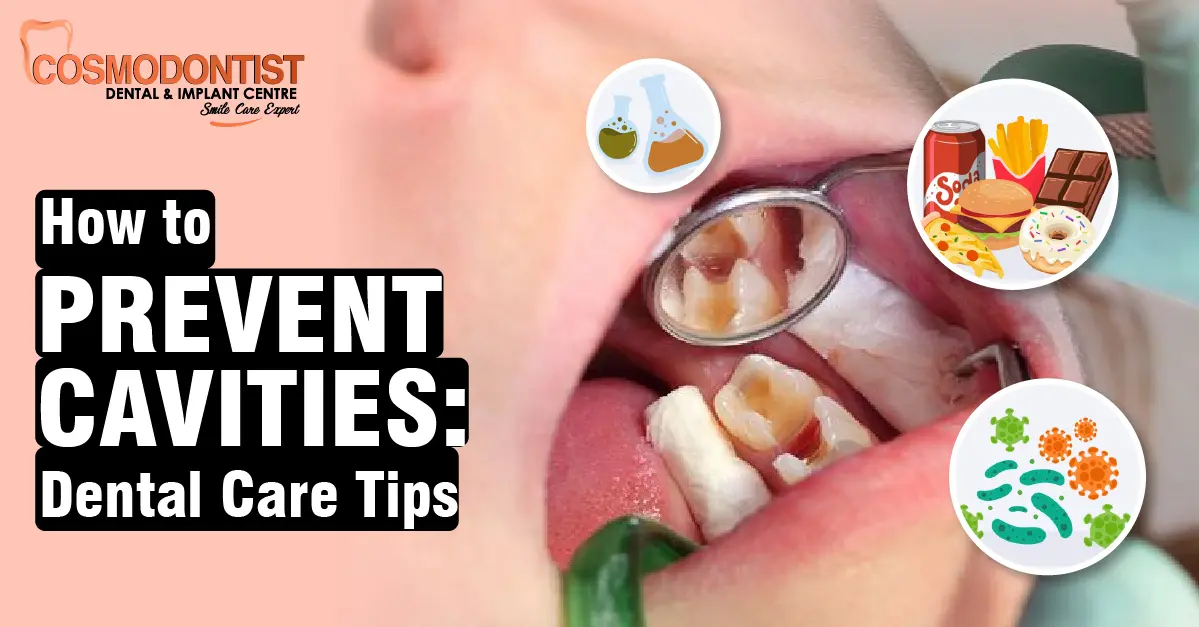
How to Prevent Cavities: Dental Care Tips
Let’s explore what Cavities is, how it develops, and actionable tips to prevent and treat cavities effectively.
How to Prevent Cavities
Cavities or tooth decay are one of the most common dental problems. They happen when bacteria in your mouth break down leftover food, producing acids that damage your tooth’s protective outer layer, called enamel. Over time, this damage creates a hole in your tooth, known as a cavity. If cavities aren’t treated, they can cause pain, infections, or even tooth loss.
What Are Cavities?
Cavities is the process by which your teeth break down due to acid attacks from bacteria in the buccal cavity. When we consume sugary or starchy foods, these bacteria feed on the remnants, producing acids that attack the tooth enamel, eventually leading to a tooth cavity.
Types of Teeth and Their Risk of Cavities
- Incisors and Canines: These teeth are smoother and less likely to develop cavities.
- Premolars and Molars: These back teeth are more prone to decay because their grooves and pits trap food particles, leading to plaque teeth buildup and cavities.
Symptoms of Cavities

Recognizing the early signs of Cavities can save you from more complex cavity treatments later. Common symptoms include:
- White or dark spots on teeth (early decay).
- Sensitivity to hot, cold, or sweet foods and drinks.
- Toothache or discomfort when chewing.
- Visible holes or pits in the teeth, often called small cavities.
- Bad breath or an unpleasant taste in your mouth due to bacterial activity.
What Causes Cavities?
Cavities form due to a combination of factors:
- Plaque on Teeth: Plaque is a sticky biofilm that harbors bacteria. Without proper brushing and flossing, it hardens and contributes to decay.
- Sugary Diets: Frequent consumption of sugary or acidic foods fuels bacteria, accelerating decay.
- Poor Oral Hygiene: Inadequate brushing or flossing allows bacteria and acids to thrive, forming dental caries.
- Dry Mouth: A lack of saliva reduces your mouth's ability to wash away food particles and neutralize acids.
How to Prevent Cavities

Like in most diseases, the prevention of cavities can be managed by observing good hygiene, taking a balanced diet and constant dental practice. Follow these tips to maintain healthy teeth and avoid cavities:
-
1. Brush and Floss Effectively
- Brush twice daily with fluoride toothpaste to strengthen tooth enamel.
- Floss daily to remove plaque on teeth and food particles between teeth.
-
2. Limit Sugary and Acidic Foods
- Reduce consumption of candies, sodas, and acidic foods. These contribute to Cavities by feeding harmful bacteria.
-
3. Strengthen Your Teeth with Fluoride
- Fluoride is a natural enamel booster. Use fluoride toothpaste, drink fluoridated water, or consult your dentist for professional fluoride applications.
-
4. Stay Hydrated
- Water helps wash away food particles and bacteria, especially in people with dry mouth. It also dilutes acids in the buccal cavity.
-
5. Use Dental Sealants
- Ask your dentist about sealants for molars. These protective coatings prevent food and bacteria from getting trapped in grooves, reducing the risk of back tooth cavity filling.
-
6. Chew Sugar-Free Gum
- Chewing gum with xylitol stimulates saliva production, which helps remineralize enamel and reduce bacteria.
-
7. Visit Your Dentist Regularly
- Regular check-ups and professional cleanings help detect and treat small cavities before they become major issues.
How Are Cavities Treated?

If a cavity has already formed you should not panic, there are many types of cavity treatments based on the stage of the cavity.
- 1. Fillings
For minor cavities, the decayed portion is removed and replaced with materials like composite resin or amalgam. This is common for visible cavity teeth or back tooth cavity fillings. - 2. Crowns
When decay affects a large part of the tooth, a crown may be used to restore its structure and function. - 3. Root Canals
If decay reaches the tooth's pulp, a root canal is needed to remove the infection and save the tooth. - 4. Tooth Extraction
For severely decayed teeth that can’t be saved, extraction is the final option.
How to Remove a Cavity from Teeth Naturally?
While a fully formed tooth cavity cannot heal on its own, early decay (white spots) can be reversed. Here’s how:
- Use fluoride toothpaste or mouthwash to remineralize enamel.
- Avoid sugary foods and drinks to stop decay from progressing.
- Increase calcium-rich foods in your diet to support enamel health.
Frequently Asked Questions About Cavities

-
1. Can cavities go away without treatment?
No. Once a cavity forms, professional intervention is needed. However, early signs of decay may be reversed with proper care. -
2. Which types of teeth are most prone to cavities?
Molars and premolars are most at risk due to their grooves and pits, which easily trap food and bacteria. -
3. Can I prevent cavities with just brushing?
Brushing is essential, but flossing and regular dental visits are also crucial for preventing cavities between teeth. -
4. Is there a permanent cure for Cavities?
While cavities themselves can’t be "cured," they can be treated with fillings, crowns, or root canals. Preventive care is the best way to avoid future decay. -
5. How can I keep my teeth cavity-free?
Maintain good oral hygiene, eat a balanced diet, and visit your dentist regularly for professional cleanings and early detection.
Conclusion
Overall, Preventing cavities requires a combination of good oral hygiene practices, a balanced diet, and regular dental care. By understanding the causes of tooth decay and implementing these preventive measures, you can maintain a healthy, cavity-free smile.
Remember, your dentist is a valuable partner in your oral health journey. Don't hesitate to contact us.